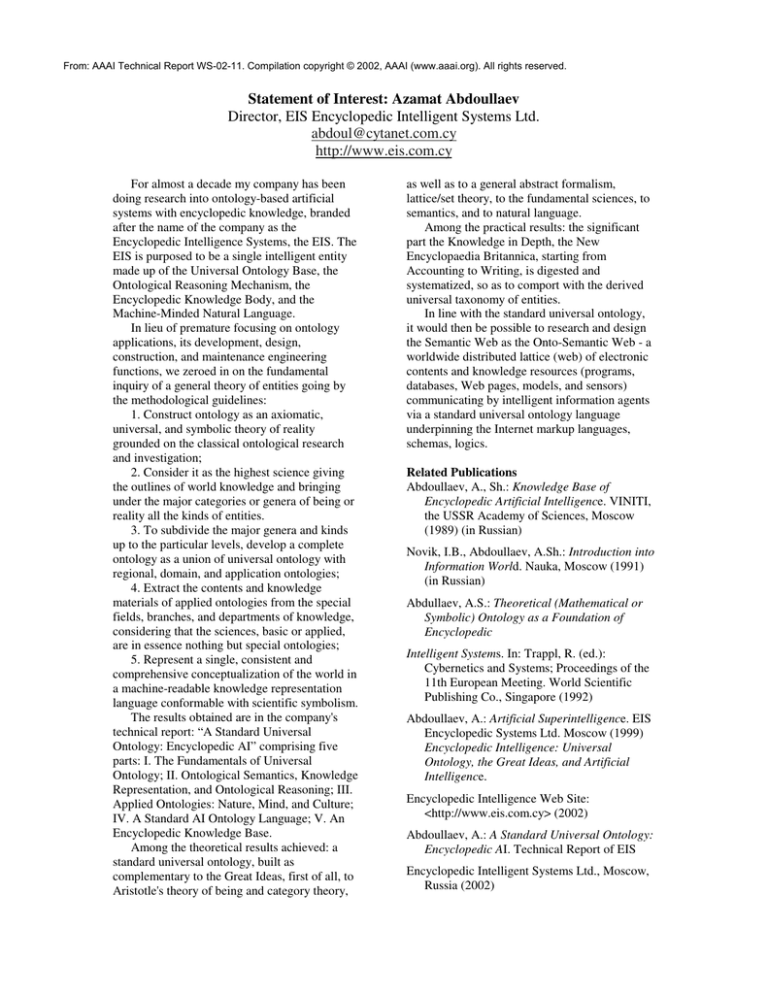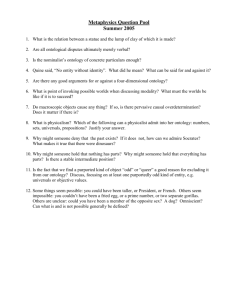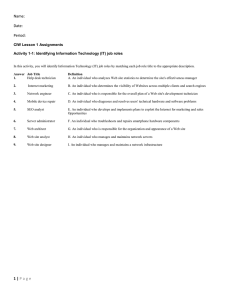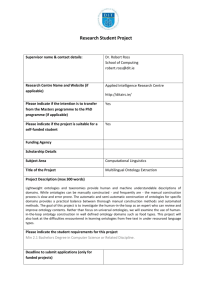
From: AAAI Technical Report WS-02-11. Compilation copyright © 2002, AAAI (www.aaai.org). All rights reserved.
Statement of Interest: Azamat Abdoullaev
Director, EIS Encyclopedic Intelligent Systems Ltd.
abdoul@cytanet.com.cy
http://www.eis.com.cy
For almost a decade my company has been
doing research into ontology-based artificial
systems with encyclopedic knowledge, branded
after the name of the company as the
Encyclopedic Intelligence Systems, the EIS. The
EIS is purposed to be a single intelligent entity
made up of the Universal Ontology Base, the
Ontological Reasoning Mechanism, the
Encyclopedic Knowledge Body, and the
Machine-Minded Natural Language.
In lieu of premature focusing on ontology
applications, its development, design,
construction, and maintenance engineering
functions, we zeroed in on the fundamental
inquiry of a general theory of entities going by
the methodological guidelines:
1. Construct ontology as an axiomatic,
universal, and symbolic theory of reality
grounded on the classical ontological research
and investigation;
2. Consider it as the highest science giving
the outlines of world knowledge and bringing
under the major categories or genera of being or
reality all the kinds of entities.
3. To subdivide the major genera and kinds
up to the particular levels, develop a complete
ontology as a union of universal ontology with
regional, domain, and application ontologies;
4. Extract the contents and knowledge
materials of applied ontologies from the special
fields, branches, and departments of knowledge,
considering that the sciences, basic or applied,
are in essence nothing but special ontologies;
5. Represent a single, consistent and
comprehensive conceptualization of the world in
a machine-readable knowledge representation
language conformable with scientific symbolism.
The results obtained are in the company's
technical report: “A Standard Universal
Ontology: Encyclopedic AI” comprising five
parts: I. The Fundamentals of Universal
Ontology; II. Ontological Semantics, Knowledge
Representation, and Ontological Reasoning; III.
Applied Ontologies: Nature, Mind, and Culture;
IV. A Standard AI Ontology Language; V. An
Encyclopedic Knowledge Base.
Among the theoretical results achieved: a
standard universal ontology, built as
complementary to the Great Ideas, first of all, to
Aristotle's theory of being and category theory,
as well as to a general abstract formalism,
lattice/set theory, to the fundamental sciences, to
semantics, and to natural language.
Among the practical results: the significant
part the Knowledge in Depth, the New
Encyclopaedia Britannica, starting from
Accounting to Writing, is digested and
systematized, so as to comport with the derived
universal taxonomy of entities.
In line with the standard universal ontology,
it would then be possible to research and design
the Semantic Web as the Onto-Semantic Web - a
worldwide distributed lattice (web) of electronic
contents and knowledge resources (programs,
databases, Web pages, models, and sensors)
communicating by intelligent information agents
via a standard universal ontology language
underpinning the Internet markup languages,
schemas, logics.
Related Publications
Abdoullaev, A., Sh.: Knowledge Base of
Encyclopedic Artificial Intelligence. VINITI,
the USSR Academy of Sciences, Moscow
(1989) (in Russian)
Novik, I.B., Abdoullaev, A.Sh.: Introduction into
Information World. Nauka, Moscow (1991)
(in Russian)
Abdullaev, A.S.: Theoretical (Mathematical or
Symbolic) Ontology as a Foundation of
Encyclopedic
Intelligent Systems. In: Trappl, R. (ed.):
Cybernetics and Systems; Proceedings of the
11th European Meeting. World Scientific
Publishing Co., Singapore (1992)
Abdoullaev, A.: Artificial Superintelligence. EIS
Encyclopedic Systems Ltd. Moscow (1999)
Encyclopedic Intelligence: Universal
Ontology, the Great Ideas, and Artificial
Intelligence.
Encyclopedic Intelligence Web Site:
<http://www.eis.com.cy> (2002)
Abdoullaev, A.: A Standard Universal Ontology:
Encyclopedic AI. Technical Report of EIS
Encyclopedic Intelligent Systems Ltd., Moscow,
Russia (2002)





